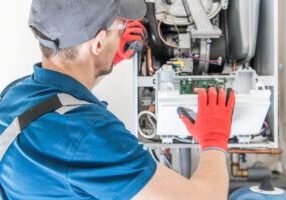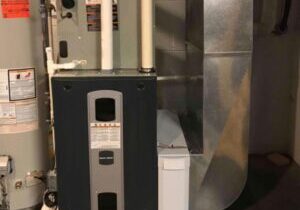A boiler is one of the most used heating systems in the U.S. Boilers are efficient and can be used in many different types of buildings, from single-family homes to commercial buildings. What exactly is a boiler, and how do they operate? Let’s look at it in more detail below.
What is a Boiler?
A boiler is a type of central heating system that uses hot water or steam to heat a building. The system can be powered by various fuel sources, such as gas, oil, propane, and electricity.
Boilers are an effective, versatile, and highly energy-efficient heating system. With good maintenance practices, boilers can provide reliable heating for your home for many years and help save on energy costs.
How Do They Operate?
A boiler central heating system consists of four main components and works as follows:
Boiler: Acts as the central component of the system. Powered by a fuel source, it heats water or generates steam.
Pipes: Connects the boiler to the heat exchangers.
Heat exchangers: Transfers heat from the pipes to different parts of the house and effectively warms the building.
Controls: Thermostats, pressure valves, and circulator pumps regulate the temperature and flow of the water or steam, ensuring the system operates safely and efficiently.
Why Boilers are Great For PA Homes
A boiler heating system is a right fit for homes in Pennsylvania for several reasons:
Winter weather: Pennsylvania’s winter can be harsh. Boilers are a reliable and effective heating system in low- temperature areas.
Energy Efficiency: Low temperature means you need constant effective heating. Boilers are one of the most energy-efficient heating systems. It can help you keep your high energy bills at bay.
Source availability: Fuel sources are readily available in Pennsylvania. The state is the second largest natural gas producer in the U.S. after Texas. This makes a boiler a convenient and affordable heating solution.
How to Keep Your Boiler in Tip-Top Shape
You must follow a regular maintenance schedule to keep your boiler in pristine condition and prolong its lifespan.
Good maintenance practices include:
- A thorough inspection of all key components, such as heating elements, controls, and burners, ensures they work as they should.
- Cleaning the exterior and interior of the system to ensure it’s free of dirt and other debris.
- Testing the system. This can include checking the pressure gauge and safety valves, ensuring they function properly.
- Regular servicing by a professional technician, preferably once or twice a year.
Regular maintenance is effective in helping keep your boilers in good condition and also preventing any significant issues.
At Spurk HVAC, we offer a special program for our customers so that they have the assurance that their HVAC system is being maintenanced on a consistent basis. Our Comfort Club Membership starts at only $15 a month. To join our comfort club, please click here for more information.
Closing Note
Boilers are popular heating systems and for a good reason. They’re versatile and effective in heating homes, especially in areas that experience freezing temperatures. Boilers are also energy-efficient, which makes them an excellent option to save on energy bills.
The most crucial aspect of having a boiler, however, is to keep it well-maintained. Without good maintenance practices, the system will perform as efficiently and can cause many major issues. This is also why you need a professional technician to handle your system to spot and deal with any problems effectively. At Spurk HVAC, we have a team of experts that can help you with any needs, from inspection and installation to repair services.










